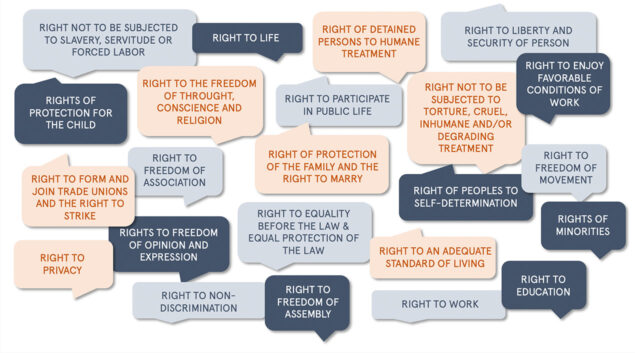
Let’s talk social sustainability for a change.
With the climate crisis and its atrocious consequences dominating news headlines and the increasing expectations for businesses to disclose their environmental impact, social issues, and human rights in particular, often end up having to take the backseat. Social sustainability is vital to the well-being of our society, as is environmental sustainability, and new legislation is catching up on human rights issues – an area where it has previously been insufficient.
To shed some light on why the subject of human rights is an essential component of a company’s sustainability transformation, this article will evaluate the importance of human rights in a corporate context, look at the new standards for companies to take action, and finally what companies can do to address what legislation hasn’t.
In February of this year, the EU proposed a new regulation to tackle human rights abuses in global supply chains. The directive on Corporate Sustainability Due Diligence (CSDD) fuses environmental and social reporting requirements for companies with at least 500 employees and €150 million in turnover (apart from high impact sectors where the threshold is 250 employees and €40 million in turnover).
On May 23rd, the public consultation period for the directive closed after having received extensive feedback from various organizations, in which major weaknesses and specific improvements were identified. To bring the directive up to par and effectively prevent corporate harm to human rights, 220 civil society organizations banded together to urge the EU to enhance access to justice for victims, strengthen climate obligations, and expand the scope to include more companies and all aspects of the supply chain. UNICEF also called for strengthening the regulation, highlighting that the CSDD must ensure respect for children’s rights everywhere. Specifically, UNICEF demanded the scope of the due diligence obligation be expanded and that it must contain explicit recognition that children, as well as other groups in vulnerable and marginalized situations, require special attention. As the directive has not yet been voted into effect, there is still time for the law to become strengthened by applying these changes.
What are human rights and why is it important for companies to safeguard them?
It goes without saying that social issues matter for both individuals and society as a whole. Naturally, this also means that they matter to organizations and businesses. Employees who feel respected at their workplace tend to be more loyal and productive, and similarly, businesses typically don’t do well when society doesn’t. Beyond this, companies also have the capacity to be drivers of change. Not only internally by ensuring fair and just practices within the organization, but also externally, by setting a standard for peers to live up to.
The idea behind human rights is pretty simple, every person around the world has a right to live a life of dignity and to be treated equally. These rights apply to everyone irrespective of nationality, religion, language, or gender. Human rights are codified in international law and the International Bill of Human Rights consists of the Universal Declaration of Human Rights, the International Covenant on Civil and Political Rights, the International Covenant on Economic, Social and Cultural Rights, and the ILO Declaration on Fundamental Principles and Rights at Work.
Companies risk having negative impacts on people through excessive overtime, low wages, industrial pollution, accidents, discrimination, forced labour, and so on. Subsequently, businesses can impact human rights both within and outside the company including the right to life, the right to education, the right to freedom of expression, the right to privacy, the right to equality, and non-discrimination. Respecting human rights is integral for all companies to do, as our societies rest upon these universally recognized and accepted standards.
The new standards aimed at protecting human rights within the supply chain
Mandatory Human Rights Due Diligence (HRDD) requirements for businesses have boomed all across the world in the past few years. HRDD is a risk management process that businesses can implement to identify and respond to actual and potential negative impacts within their own operations and supply chains. Several countries, such as France, Netherlands, Germany, and Norway have enacted their own national HRDD laws, and similar prospects have been discussed in Austria, Belgium, and Luxembourg. Similarly, the European Commission announced in 2021 that they would adopt their own directive on mandatory supply chain due diligence for all companies operating within the EU – which will most likely enter into force in 2024.
In a 2021 study on due diligence, 70% of companies said a harmonized EU legal framework on due diligence for human rights and environmental impacts is needed. A study by the UN Global Compact further confirms the need for reporting requirements, as they found 90% of its business participants to have human rights policies in place but only 18% conduct human rights impact assessments. The aim of the directive is to foster sustainable and responsible corporate behaviour and to anchor human rights and environmental considerations in companies’ operations and corporate governance. It builds on the UN’s Guiding Principles on Business and Human Rights and OECD Guidelines for Multinational Enterprises on responsible business conduct and is meant to be in line with internationally recognised human rights and labour standards.
Significant flaws in existing legislation
As is also the case with much environmental legislation, there are dangerous gaps in the HRDD proposed by the EU and Germany. As mentioned above, human rights groups and CSOs have been quick to identify the legislation’s shortcomings. Similar to the EU taxonomy, governance rules previously considered by the Commission have been scrapped following fierce lobbying by industry groups. Experts have also pointed out that the framework is potentially ineffective at the bottom of the supply chain, which is where most human rights abuses occur. The text implies that companies could fulfil their obligations by adding certain clauses in their contracts with suppliers and offloading the verification process to third parties. And as is often a challenge within the complexities of the EU, the legislation does nothing to lessen the significant hurdles of bringing transnational cases against companies. It also has a very narrow scope, only applying to the very large companies, which make up less than 0.2% of all companies operating in the EU.
National legislation also faces shortcomings when it comes to its applicability at the bottom of the supply chain. After a government study found that 83-87% of German companies were not complying with the UN Guiding Principles on Business and Human Rights (UNGPs), the government created a legally binding domestic framework in June of last year. Under Germany’s Supply Chain Due Diligence Act, companies must make reasonable efforts to ensure that there are no violations of human rights in their own business operations and in the supply chain. However, there is no duty to succeed or guarantee liability. Due diligence obligations apply only to direct suppliers and in terms of indirect suppliers, companies only have to do a risk analysis if they have “substantiated knowledge” of human rights violations or environmental damages.
Making human rights an integral part of corporate sustainability
Evidently, the new legislation is not enough. But companies still have the opportunity to go beyond current regulation by applying holistic sustainability frameworks that include social sustainability, and thereby ensure the protection of human rights. While it will take some time for HRDD regulation to catch up at a national and transnational level, companies have an ethical obligation to ensure that human rights are dealt with in a comprehensive manner at every level of their supply chain.
Ultimately, mandatory HRDD is evolving, and companies need to be prepared. Reducing carbon emissions and protecting biodiversity is not enough. Safeguarding human rights is just as much a part of corporate sustainability. One thing is certain: if companies want to flourish, or even survive in the future market, establishing a human rights due diligence process that meets the legal requirements is a must!



